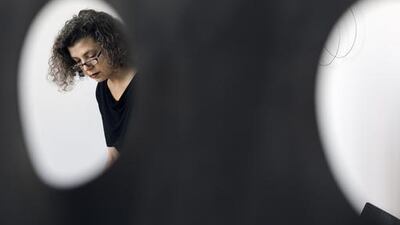“You asked me in your last letter if you could use my pictures in your work. Go ahead and use them and don’t mention a thing about it to your father.”
So says the Palestinian artist Mona Hatoum as she reads a letter from her mother as part of the sound and video installation, Measures of Distance.
The multi-layered work uses the letter, written in Arabic, to veil photographs of Hatoum’s naked mother standing with a soundtrack that combines the reading with a conversation between the two women.
“Whatever you do with the pictures, for God’s sake don’t tell him about it or we will never hear the end of the story.”
If the dialogue sounds innocuous, Hatoum’s combination of image, sound and text creates a tension between the personal and the political that has come to define the 63-year-old’s work throughout her four-decade long-career.
It’s a tension that builds as Hatoum’s deadpan delivery contrasts with her mother’s overwhelming expression of estrangement and loss .
“How I miss you and long to feast my eyes on your beautiful face that brightens up my days. When you were here the whole house was livened up by your presence,” the artist reads.
“Why don’t you come back and live here and we can make all the tapes and photographs that you want?”
Hatoum took the pictures during a visit to Beirut in 1981, by which time this child of exiles had also been exiled from her home and family for six years.
The visit was the first since Hatoum had sought refuge in London where, thanks to the outbreak of the Lebanese civil war, she was stranded as a student in 1975.
It took Hatoum seven years to make Measures of Distance, an installation that not only represents a compelling portrait of her mother and their relationship, but also examines issues of exile, dislocation, separation and loss.
Like so much of Hatoum’s work, Measures of Distance also engages with the broader themes of art history, using images of an ageing woman’s naked body to challenge conventional notions of female beauty and the depiction of the female form.
Hatoum went on to shatter such art historical conventions with Corps étranger (Foreign Body), a 1994 installation that employs endoscopic and colonoscopic footage of the artist’s body to create a claustrophobic and at times repulsive self-portrait that features magnified and often disorienting close-ups of her body cavities and skin.
Both installations tackle deep-seated taboos in Islamic and western culture and both feature in a major retrospective of the artist’s work which opened this week at the Centre Pompidou in Paris.
The show uses 32 works to chart a career that has seen Hatoum shift from working with minor works on paper and performance pieces to increasingly large-scale installations.
Many of the works, such as Keffieh (above), use remnants of Hatoum’s body such as hair, skin and nails while others, such as the billboard-sized Over My Dead Body and Grater Divide play with a sense of scale to raise questions about power relationships or to imbue familiar and seemingly innocuous household objects with a sense of menace and the quality which Freud described as the unheimlich, or the uncanny.
Vulnerability, pain, discomfort and violence, or the threat of it, are very near the surface in works such as Home (1999) and Incommunicado (1993), a child’s cot made of stainless steel in which the mattress has been replaced with thin wires reminiscent of cheese wires or an egg-slicer.
As so often with Hatoum’s work, the overall effect is one of disorientation, discomfort and unease, feelings that have also defined Hatoum’s experience of exile.
Thanks to its subject matter, critics have often defined Hatoum’s work as being profoundly political and intimately connected with the post-nakba Palestinian experience, but there are other conversations here as well, with the history of art and with Minimalism, Surrealism and Conceptualism, that reflect her life in London and Berlin as much as her childhood in Beirut.
It’s a scope that lifts the work beyond the immediate politics of the Palestinian experience, raising issues about art, power, gender and identity that are both personal and universal. Hatoum deals with issues that should matter to us all.
• Mona Hatoum opened this week at the Centre Georges Pompidou, Paris and runs until September 28. For information, visit www.centrepompidou.fr.
Nick Leech is a features writer at The National.

